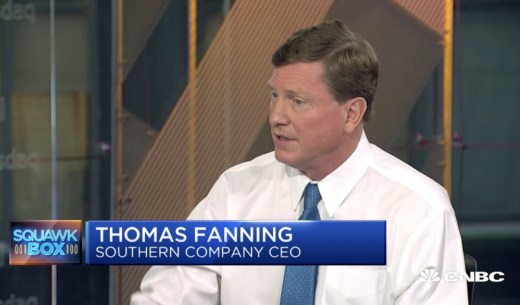In a major blow to proponents of “clean coal” technology, Southern Co., parent company of Mississippi Power, announced in a Securities and Exchange Commission filing today that it’s throwing in the towel on efforts to generate electricity from coal and will instead use only natural gas at its flagship Kemper County, Mississippi power plant.
The project, which relied on a “gasifier” to turn a cheap and common grade of coal into fuel, is over, at least for now, Southern said.
“On June 28, 2017, Mississippi Power notified the Mississippi PSC that it is beginning a process to suspend operations and start-up activities on the gasifier portion of the Kemper IGCC.”
Further, Southern warned that it may record a $3.4 billion loss for the project in the second quarter of 2017, depending on how negotiations with state utility regulators unfold.
If “Mississippi Power does not ultimately obtain rate recovery of the $3.4 billion … , Southern Company and Mississippi Power would be required to recognize a charge to income in the second quarter of 2017 for those unrecovered costs, in addition to any other costs required to be incurred,” the SEC filing says.
The filing comes on the heels of a historic vote by Mississippi’s state regulators that rejected asking the 187,000 customers who may get electricity from Kemper to pay for the long-delayed and far over-budget “clean coal” experiment. The 582-megawatt plant, initially projected to cost $1.8 billion, has so far run up a bill of over $7.5 billion in construction and engineering expenses. In comparison, a typical 700-megawatt natural gas plant would have cost rougly $700 million to build, according to the Wall Street Journal.
Earlier this month, Southern told investors that vital machinery for the coal-powered section of the plant had started leaking, and would take 18 to 24 months to repair.
Mississippi Power Co. still plans to try to recover some or all of the $3.4 billion from power customers, Southern Co. said in its SEC filing. The company will pursue that through settlement negotiations and “any available settlement alternatives” and other options to recover its costs.
The state regulators have been gearing up for the potential legal battle, expanding their legal budget from $200,000 to up to $2.5 million and hiring two large law firms with experience in utilities law, as the Climate Investigations Center recently reported.
“The ultimate outcome of these matters cannot be determined at this time,” Southern Co. said in its 8-K filed today.
Over a Decade of Delays
Kemper was supposed to be the nation’s first new “clean coal” power plant, capable of taking the world’s dirtiest but most abundant kind of coal, lignite coal, and turning it into a dirt-cheap fuel providing electricity while churning out roughly the same carbon emissions as a power plant burning natural gas – a plus for the power bill as well as the planet.
Plans for the Kemper project were first announced by Southern Co. in December, 2006. Over a decade later, the power plant is still not fully up and running and its price tag has spiked from $1.8 billion then to $7.5 billion now – making it one of the most expensive power plants per megawatt ever built in the U.S.
Earlier this month, Mississippi officials sent a clear message to the plant’s builders: when it comes to “clean coal,” we’re not buying what you’re selling any more.
“Mississippians don’t want to pay for a ticket on a plane that isn’t going to fly,” Paul Patterson, a utilities investment analyst, told the Wall Street Journal.
Instead, the Kemper power plant “should operate using only natural gas,” the Mississippi Public Service Commission announced, adding that it was commencing negotiations with Mississippi Power Co. to figure out how to protect the state’s electricity customers from having to pay for a plant that seems to have been better at burning through capital than coal.
In its SEC filing today, Southern Co. said that while the “clean coal” portion of the plant is suspended, Kemper will indeed keep running on natural gas, but added that it planned to dispute some of the $3.4 billion in costs – meaning that legal battles may be only just beginning.
“We are committed to ensuring the ongoing focus and safety of employees while we consider the future of the project, including any possible actions that may be taken by the [Mississippi Public Service] Commission,” Southern Company Chairman, President and CEO Thomas A. Fanning said in a statement. “We believe this decision is in the best interests of our employees, customers, investors and all other stakeholders.”
The Kemper project has suffered from a long string of delays and cost-over runs. The most recent setback, which was made public by Southern on June 5, will require builders to rip through a dense labyrinth of steel pipes to replace crucial equipment that’s already started leaking, adding up to two years of additional work at a cost of $164 million.
Company records, recorded phone calls and other testimony provided to the New York Times last year by a whistleblower showed Southern Co. officials may have deceived investors and the public by knowingly concealing problems along the way. Last May, the Securities and Exchange Commission launched an investigation into those concerns.
Subscribe to our newsletter
Stay up to date with DeSmog news and alerts






